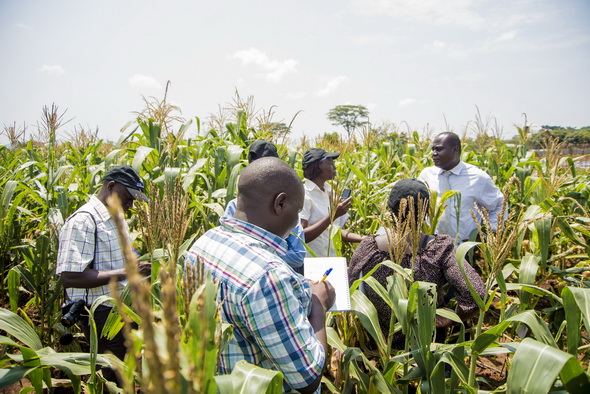
Ugandan Journalists Vow to Change the Rhetoric against Science
March 14, 2018| |
The Cornell Alliance for Science, in collaboration with Water Efficient Maize for Africa (WEMA) Project, Uganda Biosciences Information Center (UBIC), and other partners conducted a two-day training workshop on agricultural biotechnology for Ugandan journalists from March 9-10, 2018 at the National Crops Resources Research Institute (NaCRRI) in Namulonge, Wakiso district, Uganda.
The workshop brought together representatives of the fourth estate from various media houses in the country. The objective was to provide tips and guidance on how agricultural biotechnology stories can be reported in a manner that is appealing to one's audience using the Water Efficient Maize for Africa (WEMA) Project as a case study.
Speaking at the event, Dr. Godfrey Asea-Director NaCRRI expressed optimism that farmers will soon be allowed to use GM crops currently in field trials in the country. "Once the (biosafety) law is ready, we have a promising product to move to the next episode of deregulation and deployment," noted Dr. Asea while addressing workshop participants during a tour of the WEMA field trial at NaCRRI.
This comes on the backdrop of a protracted political stalemate regarding application of some modern biotechnologies for agricultural development in Uganda. This has resulted in efforts to get products of modern agricultural technologies, such as GM crops, into the hands of farmers stifled due to the absence of a national enabling policy. Uganda's National Biosafety Act passed by Parliament in October 2017 was referred back by President Museveni citing concerns that have been addressed.
The workshop participants deliberated on critical issues associated with science communication. They also brainstormed on a strategic way forward to change the rhetoric against science in the media and facilitate science-based decision making in a time of unprecedented urgency.
For more details, contact ubic.nacrri@gmail.com.
| |
Biotech Updates is a weekly newsletter of ISAAA, a not-for-profit organization. It is distributed for free to over 22,000 subscribers worldwide to inform them about the key developments in biosciences, especially in biotechnology. Your support will help us in our mission to feed the world with knowledge. You can help by donating as little as $10.
-
See more articles:
-
News from Around the World
- African Seed Companies Encouraged to Invest in Biotechnology
- Ugandan Journalists Vow to Change the Rhetoric against Science
- Scientists Engineer Crops to Use 25% Less Water; Resist Drought
- Researchers Discover How Weeds Develop Glyphosate Resistance
- Forty Years of Data Quantifies Benefits of Bt Corn Adoption Across Different Crops
- Report Confirms Ban on GM Crops in South Australia Does Not Deliver Any Benefits to Farmers
- Japan to Finalize GE Labeling Requirements Soon
- Study Quantifies Cost of Delayed GM Canola Adoption in Australia
- GMOinfo.eu Website is Launched
-
Research Highlights
- Researchers Develop GM Sugarcane with Pyramided Insecticidal Proteins
- Maize Gene Improves Drought Tolerance and Grain Yield in Rice
- RNAi Confers Resistance Against Sugarcane Mosaic Virus
-
Beyond Crop Biotech
- First-Ever Transgenic Tick to Help Fight Tick-Borne Diseases
-
Announcements
- 2nd Biotechnology World Symposium
-
Plant
- CRISPR-Cas9 Found Applicable to Alfalfa
- Scientists Study Seed Germination in Lettuce Using CRISPR
- Chinese Researchers Study Abiotic Stress Tolerance Genes in Rice
- Safer Potatoes Developed Using CRISPR-Cas9
-
Read the latest: - Biotech Updates (February 18, 2026)
- Gene Editing Supplement (January 28, 2026)
- Gene Drive Supplement (February 22, 2023)
-
Subscribe to BU: - Share
- Tweet

